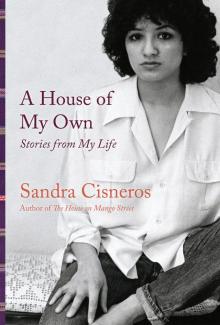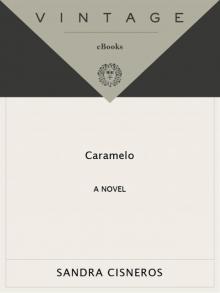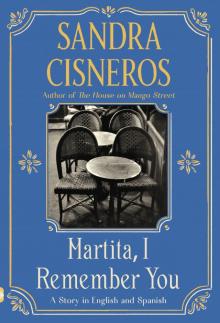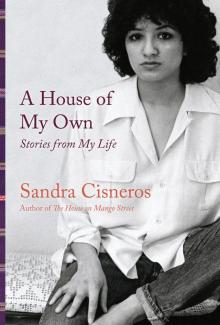- Home
- Sandra Cisneros
Caramelo Page 4
Caramelo Read online
Page 4
Aunty Light-Skin’s real name is Norma, but who would think to call her that? She’s always been known as la Güera even when she was a teeny tiny baby because, —Well, just look at her.
The Awful Grandmother is the one whose name ought to be the Parrot because she talks too much and too loudly, who squawks from the courtyard up to the second-story bedrooms, from the bedrooms down to the kitchen, from the rooftop all through the neighborhood of La Villa, the hills of Tepeyac, the bell tower of la Basílica de la Virgen de Guadalupe, the twin volcanoes—the warrior prince Popocatépetl, the sleeping princess Iztaccíhuatl.
Father’s name is el Tarzán, Tío Tarzán to my cousins, Uncle Tarzan, even though he doesn’t look like Tarzan at all. In his bathing suit he looks like an Errol Flynn washed up on the beach, pale and skinny as a fish. But when Father was a little boy in Mexico he saw a Johnny Weissmuller movie at the neighborhood movie theater, The Flea. From that moment on, Father’s life was changed. He jumped from a tree holding a branch, only the branch didn’t hold. When his two broken arms were set and his mother cured from the fright she asked, —¡Válgame Dios! What got into you? Were you trying to kill yourself, or kill me? Answer!
How could Father answer? His heart was filled with so many wonders there were no words for. He wished to fly, he wanted to shout with the voice of the wind, he wanted to live in the sea of trees with the monkeys, satisfied picking each other’s lice, glad to be shitting on people below. But how can one say this to one’s mother?
Forever after Father was nicknamed el Tarzán by his cuates. Inocencio took his nickname in stride. El Tarzán was not so bad. Inocencio’s best friend since the first grade was el Reloj, the Clock, because he was born with his left arm shorter than his right. At least Inocencio was not as unlucky as the neighbor who lost an ear in a knife fight and was, from that day till his death, called la Taza, the Cup. And what about the pobre infeliz who survived polio with a gimp foot, only to be named la Polka. Pobrecito el Moco, the Snot. El Pedo, the Fart. El Mojón, the Turd. Life was cruel. And hilarious all at once.
Juan el Chango. Beto la Guagua because he could not say “agua” when he was little. Meme el King Kong. Chale la Zorra. Balde la Mancha. El Vampiro. El Tlacuache. El Gallo. El Borrego. El Zorrillo. El Gato. El Mosco. El Conejo. La Rana. El Pato. El Oso. La Ardilla. El Cuervo. El Pingüino. La Chicharra. El Tecolote. A whole menagerie of friends. When they saw each other at a soccer match, they’d shout, —There goes el Gallo over there. And instead of shouting, —Hey, Gallo!—they’d let loose a rooster crow—kiki-riki-kiiiiiiii—which would be answered by a Tarzan yell, or a bleat, or a bark, or a quack, or a hoot, or a shriek, or a buzz, or a caw.
* Before Jiminy Cricket, there was Cri-Crí, the Singing Cricket, the alter ego of that brilliant children’s composer Francisco Gabilondo Soler, who created countless songs, influencing generations of children and would-be poets across América Latina.
9.
Aunty Light-Skin
Aunty Light-Skin sleeps like a drowned lady, so far away from the living. A tiny speck in the horizon. Her limbs heavy and soaked with salt water. A terrible effort to raise that waterlogged body from the bed. The Awful Grandmother must help her up each morning, button Aunty into her pink-quilt robe, lead her by the hand up the stairs and past the dining room where we are cracking little eggshell hats on our soft-boiled eggs.
—How did you sleep, Aunty?
—Like the dead, Aunty says. The Awful Grandmother leading the way to the bathroom, Aunty Light-Skin with her eyes closed letting herself be led.
Aunty Light-Skin wears metallic thread cocktail dresses to work, tight skirts with a kick pleat in the back and matching bolero jackets with cloth buttons. Beaded sweaters, grasshopper-green silk blouses with mandarin collars, or sleeveless crepe de chine. Crocodile-skin stilettos and crocodile handbag. Brown suede with leopard collar and leopard gloves. Pillbox hats with rhinestones on the veil. Aunty always looks elegant. Because she doesn’t shop at El Palacio de Hierro or Liverpool like the other office girls. Her clothes are from Carson Pirie Scott and Marshall Field’s.
—Ay, so much for just a little office job! Aunty Licha sniffs when the Grandmother and Aunty Light-Skin have left the room.
—How the hell does she afford such fancy duds? Aunty Ninfa adds. —I mean, Jesus Christ, with just a secretary’s salary? Nice work if you can get it.
Mother says, —Well, if you ask me she must be very, very good at what she does.
The daughters-in-law burst out laughing.
Aunty Light-Skin has to dress up because she works for a very important man. Señor Vidaurri.
Señor Vidaurri of the pearl-gray suits and pearl-gray hair. Señor Vidaurri of the handsome fedoras. Señor Vidaurri of the big black car. Señor Vidaurri who drives our pretty Aunty Light-Skin to his construction company every day and delivers her home each evening. Señor Vidaurri whose skin is as dark as my mother’s. That Señor Vidaurri gives our cousin Antonieta Araceli her domingo, her Sunday allowance each week, he never forgets, even though he is not her grandfather. It’s because he’s Aunty’s boss and has too much money.
When Mother and the Aunties are not discussing Aunty Light-Skin, or Señor Vidaurri, or the Awful Grandmother, they like to talk about Aunty’s husband, the one she divorced so long ago Antonieta Araceli doesn’t even remember him, whose name no one is supposed to mention because Aunty will have fits.
—Yeah, well, if you want my two cents there wasn’t a divorce, because there wasn’t a marriage, Mother says. —Know what I mean?
—How could there be a marriage? He was still legally married to two others, Aunty Ninfa whispers too loudly.
—¡No me digas! Aunty Licha says.
—One in Durango and one in Tampico. That’s why she had to leave him, Ninfa continues. —That’s the way I heard it.
—¡A poco! What a barbarity! says Licha.
—I’m just telling you what I heard.
We are already finished with breakfast, wiping away the milk mustaches with our napkins when Aunty Light-Skin reemerges from the bathroom, her little eyes bright apostrophes, her mouth a tangerine heart, hair finger-combed into wet waves. She is rushing about asking someone to zipper her into an aqua dress with spaghetti straps and pink sequins, she is stumbling into black patent leather stilettos that crisscross at the ankle, tossing things hurriedly from last night’s silver sequin clutch to this morning’s black envelope bag, her high heels grating along the corridor tiles.
From the courtyard Aunty’s voice sounds almost like the parrot voice of the Awful Grandmother.
—Oralia, move the rubber tree into the sun, and make sure you water it thoroughly. Mamá, ask for three tanks of gas this time from the gas man, don’t forget. Antonieta Araceli, mija, the money for the flowers for the dead nun, look on my dresser, I left it knotted in a handkerchief. Oralia, have Amparo iron my silk blouse, the one with the embroidered flowers, not the white one, the other one. And have her take care not to scorch it. Mamá, can you have my things picked up from the cleaners? Don’t wait to have supper with me, I’m eating out tonight. Antonieta Araceli, stop chewing your fingernails. You’ll only make them worse. Use a nail file.… Ask your abuela to find you one. ¡Antonieta Araceli! ¡Oralia! ¡Mamá! ¡Oralia!
She doesn’t stop yelling until the tán, tán, tán of Señor Vidaurri’s car horn. The green iron gate slamming shut with a reverberating clang.
10.
The Girl Candelaria
The first time I see anyone with skin the color of a caramelo I am walking behind the Grandmother and step on the Grandmother’s heel.
—Clumsy! Look where you’re going!
Where I am looking is the rooftop laundry room where the girl Candelaria is feeding clothes through a wringer washer. Her mother, the washerwoman Amparo, comes every week on Monday, a woman like a knot of twisted laundry, hard and dry and squeezed of all water. At first I think Amparo is her grandmother, not her mama.
—But how could a
girl with skin like a caramelo have such a dusty old mother?
—¡Hocicona! the Awful Grandmother says, calling me a big-mouth. —Come here. And when I am within reach, thwacks me on the head.
The girl Candelaria has skin bright as a copper veinte centavos coin after you’ve sucked it. Not transparent as an ear like Aunty Light-Skin’s. Not shark-belly pale like Father and the Grandmother. Not the red river-clay color of Mother and her family. Not the coffee-with-too-much-milk color like me, nor the fried-tortilla color of the washerwoman Amparo, her mother. Not like anybody. Smooth as peanut butter, deep as burnt-milk candy.
—How did you get like that?
—Like what?
But I don’t know what I mean, so I don’t say anything.
Until I meet Candelaria I think beautiful is Aunty Light-Skin, or the dolls with lavender hair I get at Christmas, or the women on the beauty contests we watch on television. Not this girl with too many teeth like white corn and black hair, black-black like rooster feathers that gleam green in the sun.
The girl Candelaria with long bird legs and skinny arms is still a girl, even though she is older than any of us. She likes to carry me and pretend she is my mama. Or I can say, —Caw, caw, caw—and she will drop a little piece of Chiclets gum in my mouth as if I was her little bird. I say, —Candelaria, swing me in a circle again, and she will swing me. Or, —Be my horsie, and she tugs me on her back and gallops across the courtyard. When I want, she lets me sit on her lap.
—And what do you want to be when you grow up, Lalita?
—Me? I want to be … a queen. And you?
Candelaria says, —I want to be an actress, like the ones that cry on the tele. Watch how I can make myself cry. And we practice trying to make ourselves cry. Until we start laughing.
Or she takes me with her down the street when she is sent to run an errand. On the way there and back, we say, —Let’s play the blind game, and take turns walking down the street with our eyes shut, one leading, the other being led. —Don’t open your eyes until I say. And when I do, I am standing in front of the gate of a strange house, the girl Candelaria laughing and laughing.
¿Qué quiere usted?
Mata rile rile ron.
Yo quiero una niña.
Mata rile rile ron.
Escoja usted.
Mata rile rile ron.
Escojo a Candelaria.
Mata rile rile ron.
When we play mata rile rile ron I want to hold hands with you, Candelaria, if your mother will let you, just for a little, before you go back to the job of the laundry, please. Because did I tell you? The girl Candelaria is a girl who likes to play even though she wakes up with the rooster and rides to work asleep on the hard shoulder of her mother, the old washerwoman, the long ride into the city, three buses to the Grandmother’s house on Destiny Street each Monday, to wash our dirty clothes.
—How can you let that Indian play with you? my cousin Antonieta Araceli complains. —If she comes near me, I’m leaving.
—Why?
—Because she’s dirty. She doesn’t even wear underwear.
—Liar! How do you know?
—It’s true. Once I saw her squat down behind the laundry room and pee. Just like a dog. I told the Grandmother, and the Grandmother made her scrub all of the roof with a bucket of soap and the broom.
Who can say if the cousin Antonieta Araceli is telling the truth or telling a story? To see if it’s true that Candelaria doesn’t wear underwear, my brother Rafa makes up this game.
—We’re going to play “It” except you can’t be tagged “It” if you squat down like this, understand? Now I’m “It.” Run!
Everyone, brothers and cousins, scatters across the courtyard. When Rafa tries to tag Candelaria, she hunkers like a frog, and the rest of us squat down too and look. Candelaria smiling her big corn teeth smile, skinny legs drawn beneath her.
Not underpants. Not exactly. Not little flowers and elastic, not lace and smooth cotton, but a coarse pleat of cloth between her legs, homemade shorts wrinkled and dim as dish towels.
—I don’t want to play this game anymore, Rafa says.
—Me neither.
The game ends as suddenly as it began. Everyone disappears. Everyone is gone. Candelaria squatting in the courtyard, grinning her big teeth grin like kernels of white corn. When she gets up finally and comes toward me, I don’t know why, I run.
—Stop that! Stop it, Mother scolds. —What’s wrong with you?
—It’s that my hair is laughing, I say.
Mother makes me sit on her lap. She tugs and parts my hair in every direction.
I’m rushed to the outdoor sink, my scalp scrubbed raw with black soap till my crying makes Mother stop. Then I’m not allowed to play with Candelaria. Or to even talk to her. And I’m not to let her hug me, or chew the little cloud of gum she passes from her mouth to her fingers to my mouth, still warm with her saliva, and never let her carry me on her lap again as if I was her baby. —Never, understand?
—Why?
—Because.
—Because what?
—Because they won’t let me, I shout from the courtyard balcony, but before I can add anything else they bring me inside.
Candelaria in the courtyard leaning against the wall, biting a thumbnail, or standing on one stork leg, or slipping off her dusty shoes with the backs squashed like house slippers, making a circle with her big toe on the courtyard tiles, or folding sheets, or hauling a tin basin of wet laundry to the rooftop clothesline, or hunkered in a game we made up, the dingy cloth of her underpants like the wrinkled diaper Jesus wears on the cross. Her skin a caramelo. A color so sweet, it hurts to even look at her.
11.
A Silk Shawl, a Key, a Spiraling Coin
—A silk rebozo? From Santa María? For what? So that Celaya can mop the floor with it? Really, Inocencio, where’s your head? What does a little girl need a silk shawl for?
—It’s that I promised Lalita we’d find her one one day. Isn’t that right, Lala? Father says, tapping his cigarette into his coffee cup, the ash dropping with a sizzle. Then he breaks into a Cri-Crí song about a duck that wears a rebozo.
—But silk, Inocencio! How exaggerated! the Grandmother says, plucking the cup off the table and replacing it with a “souvenir” ashtray stamped “Aeromexico.” —You’re talking about shawls that cost a fortune. They don’t make them anymore. Good luck trying to find one.
—Not even here in the capital?
—They’re disappearing. If you want an authentic one, you’ll have to find a family that’s willing to part with it. Some old lady who needs the centavos, somebody going through hard times. No, the famous rebozos from my village you can’t find anymore. Go look here in the capital. Look in the countryside. Ask and see if I’m lying. All you’ll come back with are the ones they sell in the market. Factory made. Rebozos that look as if somebody made them with their feet. And not even artificial silk! Of that, you can be sure. Look, the more work is put into the fringe, the higher the price. Like this one I’m wearing, count how many rows of braiding … Just count. This one?!!! I already told you. Not for sale. Not even if God commanded it. Not while I’m alive. Don’t even ask.
—What, what, what? What’s not for sale? the Little Grandfather says, coming back to the table for his second cup of coffee and another pan dulce.
—We were talking about silk rebozos, Papá, Father says. —I wanted to find one for Lalita.
—I was saying you can’t find them anymore, Narciso. You tell him. Better he buy Celaya one of the cotton ones in the market, am I right? No use spending on something she can’t even wear till she grows up. And what if she grows up and doesn’t even want to wear it. Then what, eh? So that she can save it for her funeral? Over there on the other side do they even wear them? I don’t think so. They’re too modern. Why, my own daughter doesn’t even want to be seen wearing a rebozo. In another generation they’ll look on them as rags, barbarities, something to spread on a
table or, God forbid, a bed. If you find a real silk one, better buy it for your mother. I’m the only one who knows the true worth of a rebozo around here.
—Listen to your mother, Inocencio. The Devil knows more from experience …
—Than from being the Devil. I know, I know.
After coffee and a sugared cuernito, the Little Grandfather is satisfied and makes the same joke he always makes after each meal:
—I sleep. And it makes me so huuuun-gry. Then I eat. And it makes me so sleeeee-py!
—Out, out, all of you! the Grandmother scolds, shooing us out of the dining room with her shawl as if we are flies. —How are we ever going to get this table clean with everyone dawdling about after every meal?
It’s the hour of the nap. The house is finally quiet, all the apartments are still, front and back, up and down, even the courtyard. The world is napping. As soon as Oralia has cleared off the lunch dishes, the Grandmother retreats to her room. Bedroom door shut, key click-clicking twice behind her. Everyone knows better than to knock.
—Never bother your grandmother when she’s napping, understand? Never!
From our side of the door we can hear the Little Grandfather snoring, the Grandmother’s nervous shuffling about in her chanclas with the squashed heels. They used to be the Grandfather’s slippers. The Grandfather says she never throws any of his things away even though he hasn’t worn them since … since when I was dirt.

 Have You Seen Marie?
Have You Seen Marie? Woman Hollering Creek: And Other Stories
Woman Hollering Creek: And Other Stories The House on Mango Street
The House on Mango Street A House of My Own: Stories From My Life
A House of My Own: Stories From My Life Loose Woman
Loose Woman Caramelo
Caramelo Martita, I Remember You/Martita, te recuerdo
Martita, I Remember You/Martita, te recuerdo A House of My Own
A House of My Own My Wicked Wicked Ways
My Wicked Wicked Ways